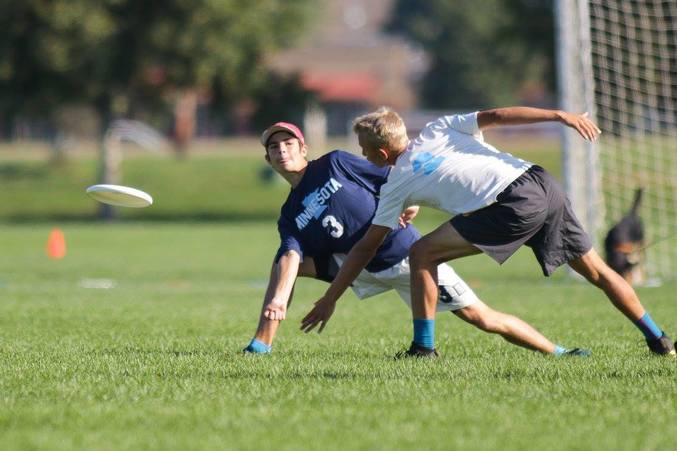|
Through Cross Cultural programming at the University of Puget Sound, I was able to participate in a lecture and workshop with race theorist and author Dr. Robin DiAngelo. As we discussed the nature of white allyship it became more and more apparent to me the need for the gender equity in sports movement to re-shape the standard we hold our male peers to. Just as having “black friends” doesn't make you anti-racist, being teammates with a woman doesn't make you a feminist. Going into the off-season, it’s the perfect time for ultimate players to take time to educate themselves and their teammates, read, learn, reflect and start thinking about where our community has room to grow in 2018. Here are five reminders for male allies, specifically in the context of youth ultimate, to keep our community on a progressive slope towards equity.
1. Consider your positionality. Dr. DiAngelo, when introducing positionality, began by laying out the the systems of hegemonic oppression within our society which are visible through our white patriarchy. In her words, “Oppression is so organized, so manifested, that we don't see it. Could men take away our right to vote? The answer is yes.” There are two aspects of positionality that male allies in ultimate need to understand: firstly, their positionality as a male, most likely a white male, that allows them to live their life with power and comfort. Secondly, their positionality within ultimate allows them similar powers and comforts shown through small, seemingly meaningless power differences based on gender. For example, in the article, Male Privilege: Unpacking the Invisible Knapsack, which challenges privilege through the lens of ultimate, some of the prompts asked: If I am not getting passed to on the field, "I can logically assume it has nothing to do with my gender" and "I am rarely asked to speak on behalf of my gender." In a hierarchical society, positionality has an impact in all social environments. As a male ally it's important to be aware of where your position is on a team and what privileges come with it. Constantly be thinking about your own comfort vs. the comfort of those around you and the power you have just because of your gender. When going into a new environment ask yourself the question: What is my position within the group and what privileges does that give me? 2. Actively work to understand and Educate yourself. Women of the ultimate community have worked tirelessly to create an abundance of different educational materials for equity and allyship. Recently open players and the Gender Equity Action Group produced Step Up Step Out and publicly challenged male-identifying players to take a stand. Just being aware of gender discrepancies isn't enough. Male allies need to take control of their education, use the resources their peers created for them and engage in dialogue about sexism in our sport. We cannot progress if men aren't trying to learn about gender equity, talk to others about gender equity and work to understand gender equity. 3. Promote female identifying and non-binary players. When you Youtube search “Ultimate Frisbee Highlights” the overwhelming majority of top results are AUDL and open ultimate. To break the stereotypes and microaggressions towards female and non-binary athletes we need to actively increase the promotion of their play and athleticism. Women’s and girl’s ultimate deserves equal coverage, access, and most importantly, respect. As a male ally it is important that you are spreading awareness about inequitable coverage of promotional material based on gender. More importantly, when you have access to that material, PROMOTE IT. Increase your personal support of women’s, girl’s and mixed ultimate and encourage others to do the same. 4. Don't just think about it, DO something. As a male ally you need to challenge male silence. When you see inequity on and off the field, challenge it. Remove the burden of confronting sexism from the hands of your female teammates, peers, youth athletes and friends. Start the conversation, don’t just participate in it. 5. SUPPORT GIRLS ULTIMATE. Based on USAU member demographics for 2017, only 34% of U19 players were registered in the girls division. Girls ultimate is often troubled with the impact of low-turnout, lack of programs, having to transition to playing open and a significant lack of promotion. As a male ally you can encourage girl’s ultimate by coming to local events, sharing updates on social media about youth teams, coaching a program and donating to advocacy organizations like GUPI and AGEUP.
1 Comment
|
Introducing Inside Out, a weekly blog written by GUPI board member, Emma Piorier. Inside Out will reflect on Emma's experiences as a youth athlete within Club, high school and college Ultmate through the lens of gender and gender equity. The goal of Inside Out is to highlight the experiences of a youth female athlete, introduce thought provoking questions about gender in our sport and comment on current events within the Ultimate community. Emma hopes to create dialogue about the sexism that plagues athletics, dismantle the apathy we have towards subtle sexism and promote youth ultimate players.
AuthorEmma Piorier founded GUPI her senior year of high school when she became frustrated with the lack of inclusion, appreciation of and advocacy for youth female athletes in the Ultimate community. She is now attending the University of Puget Sound where she is playing frisbee, studying spanish and politics, hiking around Washington and writing for GUPI. Archives
December 2017
Categories |

 RSS Feed
RSS Feed
